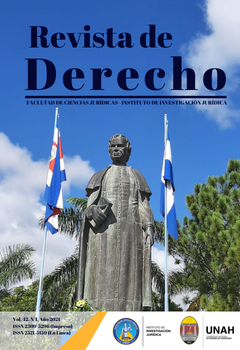Business Management as an obligation in Roman Law and its regulation as" Quasi Ex Contractu "in the Colombian civil code
The obligation is the bond of law which binds us by necessity or according to the laws of our state
DOI:
https://doi.org/10.5377/lrd.v42i1.12942Keywords:
Informal management, Stipulation, Civil Code, Roman Law, Quasi-contract, MandateAbstract
For a long time it was believed that the figure of the Business Management was considerably new, that it had nothing to do with the ancient Roman Law, being this, a wrong conception in which any jurist or professional of the law could incur, since the majority of Latin American codifications are intimately inspired in this institution, being the negotiorum managerum a true source of obligations.
In the exercise of my duties as Registrar of Public Instruments, I found myself in the task of knowing and qualifying various types of contracts, both commercial and civil, the most recurrent being the contract for the sale of real estate.
However, I was able to observe that within certain testimonies of sale and purchase, an Official Manager (negotiorum gestor) acted as purchaser on behalf and representation of another who was absent (dominus), but who legally acquired the rights and obligations arising from that contractual relationship.
Thus, the legal conflict was generated before our offices when, in the opposite direction, that informal manager appeared in his capacity as a seller, transferring the rights and obligations of that property that might correspond not to him, but to the owner of the same, for which we proceeded to provisionally deny its registration, based on the argument that this legal figure applied only when rights or obligations were acquired in favor of the original owner, not to transfer them.
Another consideration on which we based our refusal was that, in order to consider such sale valid, a special power of attorney (mandate) was required in which the Manager was authorized to consolidate the sale of the property, in the name and on behalf of the legitimate owner.
It is evident that many professionals and notaries in general, tend to confuse the rights and obligations arising from the management of businesses in analogy with those of the mandate itself, and although there are some similarities, the differences between them are considerably abysmal.
The Colombian Civil Code regulates the informal management or management of other people's businesses from article 2304 to 2312, establishing conceptual definitions and different legal parameters that regulate this figure generating obligations.
From the above, it is worth asking if in reality, the figure of the Management of business was used in Roman Law in the same way, that is, to acquire rights and obligations for the benefit of the absent and not to transfer them.
Justiniano reveals how an obligation has the legal capacity to demand from the contracting parties and thus consummate an action for or in favor of another one, protecting itself in the own codifications of a certain country or region, prevailing in the initially mentioned thought, principles like the one of legality and good faith.
Downloads
3739
Downloads
Published
How to Cite
Issue
Section
License
® Instituto de Investigación Jurídica




